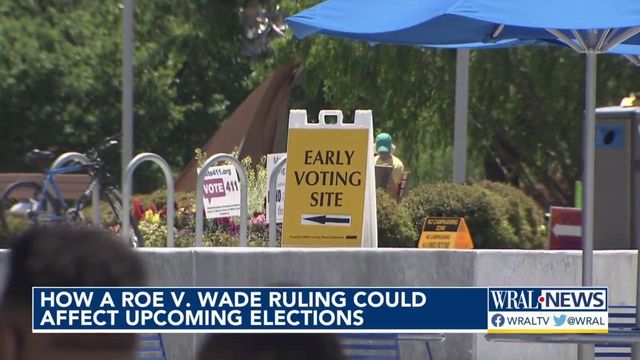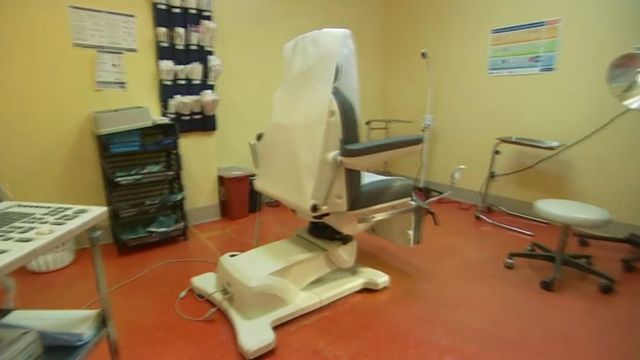Abortion takes on heightened political importance as NC primary nears
Top candidates in competitive races shared their views on abortion in light of a leaked draft opinion from the U.S. Supreme Court indicating that it could overturn Roe v. Wade.
Posted — UpdatedOn Tuesday, candidates for major races across the state weighed in, with some looking to differentiate themselves against people in their own parties ahead of the May 17 primary.
In the Republican primary race for U.S. Senate, for instance, former Gov. Pat McCrory reiterated that he’d support abortion in limited instances, while U.S. Rep. Ted Budd and former U.S. Rep. Mark Walker expressed strong personal opposition to abortion in all cases. Meanwhile, in the Democratic primary for the state’s 1st Congressional District, former state Sen. Erica Smith is questioning whether her top opponent, state Sen. Don Davis, is pro-choice enough. Davis, meanwhile, is defending his stance.
Sweeping changes to existing federal or state law appear unlikely for now.
On the federal level, two Democratic U.S. senators, Joe Manchin of West Virginia and Kyrsten Sinema of Arizona, have opposed changes to chamber rules that would make it easier for bills to become law along pure party-line votes.
At the state level, any proposals from the Republican-controlled legislature limiting abortion would likely be rejected by Democratic Gov. Roy Cooper, and Republicans don’t have a veto-proof majority.
Republicans only need to pick up three additional seats in the state House and two in the Senate in this year's election to regain the power to override Governor Roy Cooper's veto.
“That's not many seats to pick up for Republicans or seats to lose for Democrats,” said David McLennan, a Meredith College political scientist. “... It's going to put a lot of pressure on key districts that are competitive.”
But a redrawn map to be used this year is more favorable to Democrats, making it more difficult for the GOP to get the veto-proof control. Nonpartisan analyses show a highly competitive state House map, though Republicans are expected to do well.
McLennan thinks abortion will motivate voters on both sides, but he doesn’t believe it will become the defining issue in this fall’s election. The economy is likely top of mind. But he expects most candidates to include abortion ads.
“It is such a hot button issue and a recognizable issue, particularly given what the court is likely to do,” McLennan said.
In 2024, a hotly contested gubernatorial race paired with redrawn legislative maps could bolster the prospects of abortion limits.
“The balance of the General Assembly and the Supreme Court in North Carolina has never been more important, and we will continue fighting from now through Election Day and beyond to ensure that we have pro-life majorities as we face a post-Roe future,” said a statement from Michael Whatley, chairman of the North Carolina Republican Party.
North Carolina Democratic Party Chair Bobbie Richardson said in a statement that the draft opinion could be "devastating for the millions" of residents and urged voters to elect Democrats. "There is only one way to protect our reproductive freedom and ensure everyone has the right to make their own health care decisions– elect Democrats up and down the ballot," Richardson said.
Cooper, meanwhile, said on Twitter that he had joined 16 other governors calling on Congress to “immediately protect access to women’s healthcare.”
In the meantime, many North Carolinians are waiting to see how the U.S. Supreme Court may rule on a pending case. The nation’s highest court privately voted to strike down the landmark Roe v. Wade decision, according to a leaked draft opinion from February published online Monday night by Politico. On Tuesday, Chief Justice John Roberts confirmed the authenticity of the leaked draft opinion.
With North Carolina’s May 17 primary elections quickly approaching, many prominent candidates have weighed in on the subject. Here’s how top office seekers in three key races this year would address the issue:
“As the former Chief Justice of the NC Supreme Court, I know that abortion is a fundamental right – and I will not stop fighting to protect that freedom,” she wrote on Twitter “Congress must take action and codify Roe v. Wade NOW.”
Beasley is likely to face off against Republican U.S. Rep. Ted Budd or former Gov. Pat McCrory in the general election.
McCrory said in a Tuesday news conference with reporters that he supports abortion in certain cases. “I've always had an exception for rape and incest and life of the mother.”
In a statement, Budd said he hopes the justices reach a decision “that upholds the sanctity of life and guarantees the right to life for innocent unborn children.”
Budd’s campaign website lists “protecting sanctity of life” as a top policy priority. On the campaign trail, the congressman has indicated his opposition to abortion in all cases, including rape or incest.
“It’s a tragedy when somebody finds themself there, and I want to say, ‘Why would you want to add a second tragedy to an already very tough situation?’” Budd told Nexstar Media Group. “I don’t condemn anybody that’s ever been through that, but I want to say let’s not add more tragedy to a very tough situation.”
When asked if he supports outlawing abortions even when the mother’s life is at risk, Budd replied, “I think that’s something that you have to look at. It has to be a discussion with your doctor, but let’s make sure that we don’t add more tragedy to an already tough situation.”
Former U.S. Rep. Mark Walker, another top GOP candidate, said in an interview on Tuesday that it should be left up to states to set their own laws on abortion and that governments shouldn’t allow abortions under any circumstances. While he would encourage a woman to have a child in cases of rape or incest, he doesn’t support a blanket government mandate compelling women to give birth under all circumstances. Rather, he said he’d prefer those decisions be made by a woman in consultation with her family.
“That young life did not have any say so in how it was brought into being,” said Walker, a former pastor. “From a legislative standpoint, I believe there are some situations where if it’s going to be traumatic for a potential young mother, I believe that should be up to the family. From an individual perspective, I advocate no matter what the situation is that if that life can be saved, I’m going to do it.”
Butterfield said in an April 26 interview that Davis does have some concerns about abortion but believes the state senator’s views align with the voters of his district.
His office did not immediately respond to a request for comment about Smith’s request that Butterfield drop his endorsement of Davis.
Davis wrote on Twitter Monday, “Now more than ever we must protect fundamental freedoms like abortion and ensure all families have the option to decide when and how to start a family.”
In an interview Tuesday, Smith told WRAL News that Davis can’t be trusted on the subject of abortion.
“How can we believe anything he says now when his record speaks to the exact opposite?” Smith said. “His words are a direct contradiction to his voting record.”
She cited Davis’ past votes. Davis supported a 2017 budget that provided $1.3 million to a network of crisis pregnancy centers that discourage women from getting abortions. He also backed a 2019 bill that would have made it a felony with the possibility of prison time for health care practitioners to not treat a baby born in the course of a late-term abortion as a person.
Davis was one of four Democrats supportive of the 2017 budget and two Democrats who supported the so-called “born-alive” legislation. Davis was also the only Democrat who voted to override a veto from Democratic Gov. Roy Cooper on the born-alive bill.
Davis’ campaign responded to a request for comment with a statement but didn’t immediately make Davis available for an interview. In previous interviews with WRAL, Davis has said he supports codifying Roe v. Wade but has repeatedly declined to offer more specifics.
Davis would support the Women’s Health Protection Act and Each Woman Act, which would create federal protections against restrictive state laws, his campaign said in the statement Tuesday.
Smith also called for Congress to expand the number of justices on the U.S. Supreme Court or vote to impeach Justices Clarence Thomas and Brett Kavanaugh.
Kavanaugh, who is among the conservative justices expected to overturn Roe v. Wade, privately told U.S. Sen. Susan Collins of Maine in 2018 that he considered the 1973 decision “settled law,” according to Collins.
The top candidates on the Democratic side, state Sen. Wiley Nickel and former state Sen. Sam Searcy, want to make Roe v. Wade the law of the land regardless of the U.S. Supreme Court’s opinion.
Searcy’s campaign website notes his support of abortion rights and says the candidate is “very concerned by the assault in many states on every woman's right to make their own healthcare decisions.”
Nickel’s campaign on Tuesday called the draft opinion “terrifying for women all over this country,” particularly in states controlled by Republicans.
On the Republican side, lawyer Kelly Daughtry and political newcomer Bo Hines are the leading candidates.
Hines’ campaign said the aspiring congressman only supports abortion in cases where the life of the mother is in danger.
Daughtry said in a statement that she is “ecstatic that it appears Roe v. Wade will be overturned,” but she declined to say whether she supports or opposes exemptions for rape, incest or cases where the life of the woman is at stake.
“These are horrendous and criminal situations,” Daughtry said. “Any woman facing an unplanned pregnancy needs our prayers and support. I hope that every effort can be made to protect and honor life.”
Related Topics
• Credits
Copyright 2024 by Capitol Broadcasting Company. All rights reserved. This material may not be published, broadcast, rewritten or redistributed.






